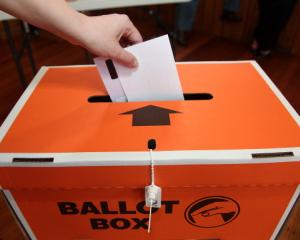Changes announced for New Zealand's two major public broadcasters are likely to become hotly debated political issues in a very short time.
The most obvious political argument will come when the Government announces, through Radio New Zealand chairman Richard Griffin, who will replace chief executive Peter Cavanagh. Radio New Zealand has resisted, mainly through the efforts of Mr Cavanagh, the commercialisation of the national and concert programmes.
But he has not been alone. Staff backed him strongly in putting up the barriers to advertisements on the Radio New Zealand National and Concert networks. Supporters of Mr Cavanagh, an Australian who came to Radio New Zealand from the SBS public broadcasting system, say he provided stability after a period of upheavals and maintained the integrity of New Zealand's publicly funded broadcaster.
It became rare for Government ministers to be interviewed on Morning Report because of the perception of a left-wing bias of the station and its staff. From once arguably leading the morning news agenda, Morning Report drifted away to become a follower of news released overnight and usually carried by newspapers and other media outlets, including morning television news broadcasts.
Mr Griffin was once a Radio New Zealand political editor who shifted into the National Party camp by working for former prime minister Jim Bolger. It would seem likely that he will be under no illusions that he will need to oversee the appointment of a new chief executive more amenable to change, particularly over sponsorship income.
Critics say resistance to change has been at the expense of innovation, and Government calls for transformation were rejected following a successful Save Radio New Zealand Facebook campaign in February 2010. At TVNZ, news and current affairs chief executive Ross Dagen announced he is leaving the state broadcaster amid growing pressure to make more profits. His resignation came weeks before the launch of his new 7pm show Seven Sharp.
Long-time broadcaster and commentator Bill Ralston speculates that Mr Dagen's bosses told him he had to kill Close Up and replace it with a younger-oriented show with more lightweight content or the 7pm timeslot would be taken from news and current affairs altogether. Mr Dagen and TVNZ insisted he was happy in the job and was leaving for family reasons.
The chairman of TVNZ is professional director Wayne Walden, who is also a director of Ports of Auckland, an organisation which has been embroiled in a campaign to break the stranglehold of the Maritime Union on its wharves. One of the new appointments to the TVNZ board last year was Richard Long, a former Press Gallery contemporary of Mr Griffin who also went on to work in the the National Party leader's office in Parliament.
The signs are pointing towards some major changes for state broadcasting in New Zealand, with both Messrs Griffin and Walden commercially focused.
Labour broadcasting spokeswoman Clare Curran insists the replacement for Mr Cavanagh must have the same commitment to commercial-free public broadcasting and respect for the station's charter. She recognises the retirement of Mr Cavanagh may be seen as an opportunity by the Government to appoint a new chief executive more amenable to advertising and sponsored content.
The chief executive is responsible for protecting the whole of Radio New Zealand, its values and the charter.
Radio New Zealand has a mandate and responsibility to the nation to deliver quality public broadcasting of the highest standards throughout all of its operations, she says. Broadcasting Minister Craig Foss is an unknown quantity when it comes to his new portfolio.
His experience as associate education minister dealing with the Novopay failures has left people wondering about his expertise. He and Education Minister Hekia Parata adopted a hands-off policy to Novopay when teachers started going unpaid.
Many New Zealanders feel strongly about non-commercial state broadcasting. The move towards bite-sized chunks of information on both TVNZ and Radio New Zealand news bulletins is already apparent. If a more commercial focus for both publicly funded organisations is seriously on the agenda, however, it will need a more carefully managed approach than throwing consultants at an issue with the end result already decided.











